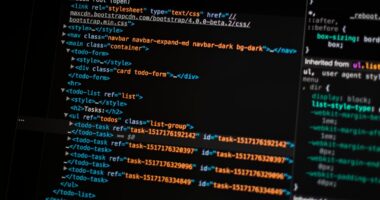NFTs, or non-fungible tokens, are unique digital assets that represent ownership or authenticity of specific digital items or content. Unlike fungible cryptocurrencies such as Bitcoin or Ethereum, NFTs cannot be exchanged on a one-to-one basis due to their distinct nature. The blockchain technology underpins NFTs, providing a decentralized and distributed ledger that records transactions across a computer network.
This ensures the uniqueness and immutability of each NFT, offering a secure and transparent method for verifying ownership and provenance. Smart contracts, which are self-executing agreements with coded terms, are also enabled by blockchain technology. These contracts automatically enforce transaction terms when NFTs are bought or sold, reducing the need for intermediaries and minimizing fraud risks.
NFTs and blockchain technology have created new opportunities for digital ownership and provenance verification. This allows content creators to monetize their digital assets and provides collectors with a secure and transparent platform for buying, selling, and trading digital content. The potential impact of NFTs extends to various industries, including art, music, gaming, and beyond, as the technology continues to develop and evolve.
Key Takeaways
- NFTs are unique digital assets that are stored on a blockchain, making them one-of-a-kind and easily verifiable.
- NFTs have revolutionized the art world by allowing artists to directly sell their work to collectors and ensuring proof of ownership through blockchain technology.
- Job opportunities in the NFT and crypto space are rapidly growing, with roles in development, marketing, and community management becoming increasingly in demand.
- Remote NFT jobs offer flexibility and the opportunity to work with global teams, but require self-discipline and strong communication skills to thrive in a virtual work environment.
- Crypto and NFT job opportunities can be found on specialized job boards, social media platforms, and through networking within the industry.
The Impact of NFTs on the Art World and Ownership
The Democratization of Art
The rise of NFTs has leveled the playing field for artists, providing them with a platform to showcase their work and connect with potential buyers. This has led to a more diverse and inclusive art world, where artists can thrive without the need for traditional gatekeepers.
Provenance and Ownership in the Digital Age
NFTs have also transformed the way we perceive ownership in the digital age. By providing a secure and transparent way to verify ownership and provenance, NFTs have solved the problem of authenticity and copyright infringement. Collectors can now have confidence in the authenticity of their digital assets, and artists can rest assured that their work is protected.
A New Era for Art and Collectors
The impact of NFTs on the art world has been profound, empowering artists to take control of their digital creations and providing collectors with a new way to invest in and appreciate digital art. As this technology continues to evolve, we can expect to see further innovation in the art world, with new opportunities for collaboration, curation, and exhibition in the digital space.
Exploring Job Opportunities in the NFT and Crypto Space

The rise of NFTs and cryptocurrencies has created a wealth of job opportunities in the digital space, spanning a wide range of roles and skill sets. From blockchain developers and smart contract engineers to digital artists and marketing specialists, there is a growing demand for individuals with expertise in NFTs and crypto. One of the most sought-after roles in this space is that of a blockchain developer, responsible for designing and implementing blockchain solutions for NFT platforms and cryptocurrency projects.
These developers must have a deep understanding of blockchain technology, as well as proficiency in programming languages such as Solidity for Ethereum-based projects. Another key role in the NFT and crypto space is that of a digital artist or designer, tasked with creating unique and compelling digital assets for NFT platforms. These individuals must have a strong creative vision and technical skills to produce high-quality digital artwork that resonates with collectors and enthusiasts.
Additionally, there is a growing need for marketing specialists who can help promote NFT projects and build communities around digital assets. These individuals must have a deep understanding of digital marketing strategies and be able to engage with audiences across various online platforms. Overall, the job opportunities in the NFT and crypto space are diverse and dynamic, offering individuals the chance to work at the forefront of technological innovation and creativity.
The Rise of Remote NFT Jobs: How to Find and Thrive in a Virtual Work Environment
| Metrics | Data |
|---|---|
| Number of Remote NFT Jobs | Increasing |
| Remote Work Environment | Virtual |
| How to Find Remote NFT Jobs | Online platforms, networking |
| Thriving in Virtual Work Environment | Communication, time management, self-discipline |
With the increasing popularity of NFTs and cryptocurrencies, there has been a rise in remote job opportunities in this space. Many companies and projects are embracing virtual work environments, allowing individuals from around the world to collaborate and contribute to the growth of the NFT and crypto industry. For individuals seeking remote NFT jobs, it is important to leverage online platforms such as LinkedIn, AngelList, and Crypto Jobs List to find relevant job postings and connect with potential employers.
These platforms often feature a wide range of remote job opportunities in areas such as blockchain development, digital art creation, community management, and more. Once hired for a remote NFT job, it is essential to thrive in a virtual work environment by establishing clear communication channels with colleagues and managers, setting up a dedicated workspace at home, and maintaining a healthy work-life balance. Remote work requires self-discipline and organization, so it is important to stay focused and motivated while working independently.
Overall, remote NFT jobs offer individuals the flexibility to work from anywhere in the world while contributing to exciting projects in the digital space. By leveraging online platforms and embracing virtual work environments, individuals can find and thrive in remote NFT jobs.
Navigating the Job Market: Where to Find Crypto and NFT Job Opportunities
Navigating the job market for crypto and NFT opportunities can be an exciting but daunting task. With the rapid growth of these industries, there are numerous job opportunities available for individuals with diverse skill sets and interests. One of the best places to find crypto and NFT job opportunities is through specialized job boards such as Crypto Jobs List, CoinDesk Jobs, and Blockchain Headhunter.
These platforms feature a wide range of job postings from companies and projects looking to hire talent in areas such as blockchain development, digital art creation, marketing, community management, and more. Additionally, individuals can leverage social media platforms such as LinkedIn and Twitter to connect with industry professionals and stay updated on the latest job openings in the crypto and NFT space. Networking with like-minded individuals can lead to valuable connections and potential job opportunities.
It is also important to keep an eye on industry events such as conferences, meetups, and webinars, where individuals can network with industry professionals and learn about new job opportunities in the crypto and NFT space. Overall, navigating the job market for crypto and NFT opportunities requires proactive networking, staying updated on industry trends, and leveraging specialized job boards to find relevant job postings.
The Evolution of Web3 and Its Influence on Job Creation in the NFT and Crypto Industry

Decentralized Finance (DeFi) and Job Creation
One area where Web3 has influenced job creation is in decentralized finance (DeFi), which aims to create an open financial system without intermediaries using blockchain technology. This has led to a growing demand for individuals with expertise in areas such as smart contract development, decentralized applications (dApps), and token economics.
Decentralized Identity Solutions and New Opportunities
Another area where Web3 has influenced job creation is in decentralized identity solutions, which aim to give individuals control over their personal data using blockchain technology. This has led to new opportunities for individuals with expertise in areas such as cryptography, cybersecurity, and decentralized identity protocols.
A New Era of Job Opportunities in the NFT and Crypto Industry
Overall, the evolution of Web3 has led to new job opportunities in the NFT and crypto industry, creating demand for individuals with diverse skill sets who can contribute to the growth of decentralized technologies.
The Future of Art and Ownership: Embracing NFTs and Blockchain Technology
As we look towards the future of art and ownership, it is clear that NFTs and blockchain technology will continue to play a significant role in shaping how we create, consume, and trade digital assets. The rise of NFTs has empowered artists to take control of their digital creations while providing collectors with a new way to invest in and appreciate digital art. Furthermore, blockchain technology has provided a secure and transparent way to verify ownership and provenance in the digital age, addressing longstanding issues of copyright infringement and unauthorized reproduction.
This has led to a democratization of the art world, allowing artists from diverse backgrounds to showcase and sell their work directly to a global audience. Overall, embracing NFTs and blockchain technology will lead to further innovation in the art world, creating new opportunities for collaboration, curation, exhibition, and ownership in the digital space. As this technology continues to evolve, it is important for individuals to understand its potential impact on various industries while exploring new job opportunities in the NFT and crypto space.
FAQs
What is NFT?
NFT stands for non-fungible token, which is a digital asset that represents ownership or proof of authenticity of a unique item or piece of content, such as art, music, videos, or collectibles, on a blockchain.
How does NFT work?
NFTs are created, bought, and sold on blockchain platforms using smart contracts, which are self-executing contracts with the terms of the agreement directly written into code. This allows for the ownership and provenance of the digital asset to be securely recorded and verified.
What is the significance of NFT in the art world?
NFTs have revolutionized the art world by providing a new way for artists to monetize and sell their digital artwork directly to collectors, while also ensuring the authenticity and provenance of the artwork through blockchain technology.
How is NFT shaping the future of ownership?
NFTs are reshaping the concept of ownership by allowing individuals to own and trade unique digital assets, such as art, music, and collectibles, in a decentralized and secure manner, without the need for intermediaries.
What are the criticisms of NFT technology?
Critics of NFT technology raise concerns about its environmental impact due to the energy-intensive process of minting and trading NFTs on blockchain platforms. There are also concerns about the potential for copyright infringement and the speculative nature of NFT markets.





